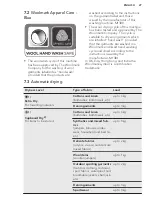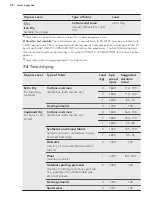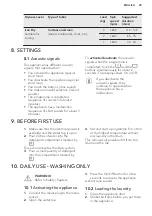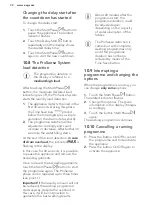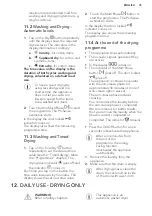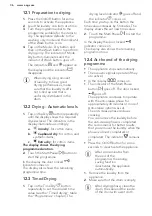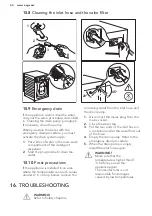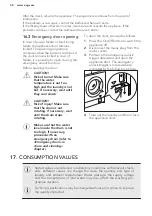
14.3
Detergents and other
treatments
• Only use detergents and other
treatments specially made for
washing machines:
– powder detergents for all types of
fabric, excluding delicate. Prefer
powder detergents containing
bleach for whites and laundry
sanitization
– liquid detergents, preferably for
low temperature wash
programmes (60 °C max) for all
types of fabric, or special ones for
woollens only.
• Do not mix different types of
detergents.
• To help the environment, do not use
more than the recommended quantity
of detergent.
• Follow the instructions that you find
on packaging of the detergents or
other treatments without exceeding
the indicated maximum level (
).
• Use the recommended detergents for
the type and colour of the fabric, the
programme temperature and the
level of soil.
14.4
Ecological hints
• Set a programme without the
prewash phase to wash laundry with
normal soil.
• Always start a washing programme
with the maximum load of laundry
allowed.
• If you pre-treat the stains or use a
stain remover, set a programme with
a low temperature.
• To use the correct quantity of
detergent, check the water hardness
of your domestic system. Refer to
"Water hardness".
14.5
Water hardness
If the water hardness in your area is high
or moderate, we recommend that you
use a water softener for washing
machines. In areas where the water
hardness is soft it is not necessary to use
a water softener.
To find out the water hardness in your
area, contact your local water authority.
Use the correct quantity of water
softener. Follow the instructions that you
find on the packaging of the product.
14.6
Prepare the drying cycle
• Open the water tap.
• Check if the drain hose is connected
properly. Refer to installation chapter
for more information.
• For the maximum laundry load of the
drying programmes, refer to the
drying programmes table.
14.7
Items not suitable for
drying
Do not set a drying programme for
this laundry:
• Synthetic curtains.
• Pieces of clothing with metal inserts.
• Nylon stockings.
• Quilts.
• Bed covers.
• Duvets.
• Anoraks.
• Sleeping bags.
• Fabrics with residue of hair sprays, nail
solvents or similar.
• Garments with foam-rubber or
materials similar to foam-rubber.
14.8
Garment labels
When you dry the laundry, obey the
indications on the labels of the
manufacturers:
•
= The item can be tumble dried
•
= The drying cycle is at high
temperature
•
= The drying cycle is at reduced
temperature
•
= The item can not be tumble
dried.
14.9
Drying cycle duration
The drying time can change depending
on:
• speed of the last spin
• dryness level
• type of laundry
• weight of the load
www.aeg.com
38




